The White Paper draft appears to be aimed at reversing David Cameron's 2012 NHS reform that envisaged the creation of a competitive tendering system involving private contractors. The leaked document insists that providing "enhanced powers" to the government will help decision makers oversee the health system more effectively. Under the new legislation, the government will be able to block hospital closures, put fluoride in water, and order the NHS to run programmes aimed at encouraging healthier lifestyles.
COVID Pandemic Brought Sharper Focus on NHS Problems
It is not a coincidence that the Johnson Cabinet came up with a healthcare reform idea amid the COVID outbreak, as the pandemic has exposed the shortcomings of the NHS, deems Dr Sabrina Germain, a senior lecturer at the City Law School and member of City University’s Centre for Healthcare Innovation Research (CHIR).
"The NHS was founded on the utopia that all the ill health on the territory could be cured if services were to be made available to all, free at the point of use", she says. "This approach led to increasing expenses as population ages, technology advances and drugs and professional services became more expensive. The Health and Social Care Act (2012) wanted to introduce bottom up change with more competition in the NHS to drive down the costs".
The NHS has undergone uncountable waves of reforms to rationalise or improve the provision and quality of care over the years, notes the academic, who described the matter in her book "Justice and Profit in Health Care Law" (2019). Reforms happened at many levels – organisational, systemic and clinical – however, not all of them have proven to be successful, she observes.
In May 2020, New Statesman quoted documents from 2010-2012 indicating that senior public health figures warned that the NHS reforms carried out under David Cameron’s Health Secretary Andrew Lansley would leave Britain vulnerable in a pandemic. For instance, the director of public health for County Durham, Anna Lynch, warned against abolishing Strategic Health Authorities (SHAs), which were vital in coordinating responses to endemics.
Pandemic planning office was scrapped by David Cameron in 2012. As result the PPE was too old and useless. NHS understaffed of Doctors and nurses due t funding cuts and Brexit. Also thousands of beds went in austerity too. We were underprepared due to 10 years of Tory austerity.
— Primal Scream (@ScreamOfficial) December 20, 2020
For their part, the UK Faculty of Public Health and the Association of Directors of Public Health (ADPH) expressed concerns over transferring power from the NHS to Public Health England, arguing that it would create "a risk that emergencies, outbreaks and epidemic situations, will not be properly managed or responded to".
May 2010 - David Cameron: "I'll cut the deficit not the NHS"; July 2012 - official figures show Cameron cut the NHS for the 2nd year in row.
— Andy Burnham (@AndyBurnhamGM) July 6, 2012
As the coronavirus pandemic engulfed the UK in spring 2020, the NHS came under criticism from trusts over the "completely chaotic" COVID-19 supply response. The UK has proven to be one of the most coronavirus-hit European nations. In January 2021, the country saw soaring COVID-related mortality rates, despite quarantine measures earlier introduced by the government.
Brexit added to the controversy, as some of the NHS staff originating from European countries left the UK. "Prior to this, understaffing was already a pressing issue and we can imagine that it will only be aggravated post-Brexit and with the general strain that the pandemic has put on NHS staff", the academic highlights.
I'm sure this will be fine. pic.twitter.com/8duIN1UCRj
— Jo Maugham (@JolyonMaugham) February 6, 2021
"The pandemic has brought into sharper focus the importance of public health (health of populations), which must have had an influence on this policy making", she says. "It may also be that the government heard the call from local authorities to act more directly during the pandemic".
Proposed Reforms Unlikely to Fix the Situation Instantly
One might wonder whether this is the best time to undertake such important changes to the system amid the public health crisis, according to Germain. Perhaps the government should "hold on to restructure the system until a clear exit strategy to the existing pandemic and clear plans to relieve pressure on the NHS are set out", she suggests.
On the other hand, it is unlikely that the government's initiative will improve the situation anytime soon since healthcare reforms "are long-term exercises" and the proposed policy is likely to be implemented in the next three-five years, the academic believes.
"At time, we may hope and assume that the virus will be under control with vaccination campaigns and treatments to help COVID-positive patients cope with the illness", Germain notes. "However, the NHS is very likely to still be dealing with the aftermath of the pandemic and the very important backlog created by the suspension of some interventions and screening procedures".
Currently, one of the top priorities of the government should be to provide more resources and more support to the system in the years to come, according to the senior lecturer. She argues that spending needs to be "significantly increased in order to help ease the backlog in treatment created by the pandemic".
"Major investments should be considered in health and social care", Germain stresses. "The NHS should therefore be prioritised with the goal to improve health outcomes".




